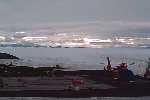
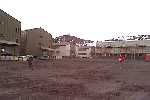
By the time we got into town, the wind had subsided and
the clouds were a threatening memory over the distant mountains. McMurdo
was gray above and brown below. There was no snow on the ground, no snow
on the hillsides, nothing to cover up the dirt and allow it to even pretend
to be pretty. It seemed strangely deserted, too: vehicles in the distance,
the beep-beep backup warning of heavy trucks, but not many people about.
I'm not sure what I expected but it looked even more like a town out of
an old western. Face the buildings with clapboard and replace the distant
roar of dumptrucks with the formalized clatter of hooves and wagon wheels,
and I could almost envision John Wayne striding out of a building across
the dirt, the freezer-chest door banging shut behind him: he faces his
nemesis, a florid beaker in a red parka with a diametrically opposing theory
about cosmic rays, and data to prove it: they face off across
the empty plaza, gun hands hovering over Palm Pilots in their belt holsters.
The Duke of Antarctica grates: "Mister, the AGU ain't big enough for the
both of us, and Ah'm gonna git to Stockholm if Ah have step over your
dead body
. "
The dream fades, I blink twice, I'm in Mactown.
My first order of business is to make sure that the equipment
arrived, and to find the person in Environmental Health who will be my
contact for the workplace air quality monitoring that we're doing for NSF.
All is well, I meet Kurt in his office, we get the aethalometer box from
the cargo warehouse and take it over to the Vehicle Maintenance Facility,
a.k.a. the 'Heavy Shop'.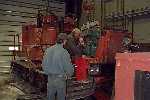 Aside from the types of vehicles up on the racks, you wouldn't know
you were in Antarctica. It's a large industrial building with pieces of
caterpillar tractor and trucks up on repair racks and rock music attempting
to drown out the sound of air tools and the banging of sledgehammers (fixing
a large caterpillar tractor ain't neurosurgery, Bub.) At one end the offices
and the stores counters are staffed by young guys wearing bass-fishing
t-shirts and young women wearing tight-fitting turtlenecks. The mechanics
curse, swear and spit into the open drums of degreaser solvent. When a
vehicle is ready to roll out, it's fired up and
.. AHA ! a huge
cloud of smoke belches into the indoor environment, before they roll up
a steel door and drive it out.
Aside from the types of vehicles up on the racks, you wouldn't know
you were in Antarctica. It's a large industrial building with pieces of
caterpillar tractor and trucks up on repair racks and rock music attempting
to drown out the sound of air tools and the banging of sledgehammers (fixing
a large caterpillar tractor ain't neurosurgery, Bub.) At one end the offices
and the stores counters are staffed by young guys wearing bass-fishing
t-shirts and young women wearing tight-fitting turtlenecks. The mechanics
curse, swear and spit into the open drums of degreaser solvent. When a
vehicle is ready to roll out, it's fired up and
.. AHA ! a huge
cloud of smoke belches into the indoor environment, before they roll up
a steel door and drive it out.
Smoke. My nose twitches, I look up at the
ceiling lamps: each light is targeted by an illuminated cone pointing upwards,
like the streetlamps of my childhood in foggy London.
The occupational air quality issue arises because almost all of the vehicles on The Ice are diesel. This allows logistics supply to provide only one fuel for almost all applications: the same kerosene can power aircraft turbine engines, vehicles, the diesel-powered main electricity generators, and can be burned for heat in the building furnaces. But the downside of diesel is the smoke with its attendant toxic compounds, and that's becoming the main reason for my visits to Antarctica.
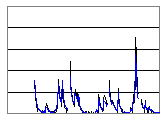
We set up the aethalometer in the Heavy Shop, switch
it on, and
it works perfectly. Each day there are two work shifts, separated
by a 2-hour break. Each shift they typically drive a few vehicles in and
out. Perfect: we should see large increases in particulate concentrations
whenever a vehicle is run, followed by a gradual drop-off as the ventilation
system brings in fresh air and removes the polluted air. In the between-shift
breaks, we should see the levels fall to essentially zero, the clean background
atmosphere.
With this first activity working according to plan, I see a sign announcing the 'End Of Season Party !! - Saturday Night - Bands Bands Bands'. As the evening progressed, the bands got worse, louder, and more appreciated by the growing and increasingly-inebriated crowd. But the first band played excellent bluegrass, the second played great swing music, the third sounded as if their instruments were taken straight from the Heavy Shop, and by the time the fourth band came on, the cans of weak, fizzy Kiwi beer could no longer dull the remnants of my judgment, and I left. Not knowing anyone to recognize by face, I had no communication, since the noise level prevented all conversation. Outside, a crowd stood and smoked and drank more beer. Suddenly, a tall young woman in fashion overalls comes up to me. "You're Tony, from the Pole last year." (I always wear a blue workshirt with a red name patch, script cursive embroidery). "You're the guy who did the Elvis impersonation at the music hour!". Finally, my name patch has achieved its purpose! - instead of getting wisecracks about checking the oil and wiping the windshield, a pretty girl comes up to me and starts talking! But my euphoria lasts a millisecond: she spots a handsome young guy in a check shirt and is gone, my acknowledgment unheard.
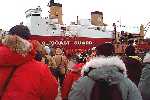
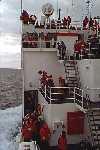 The next day, Sunday, I double-check the aethalometer in the Heavy Shop
and send the preliminary charts back to Harry by e-mail. Then, a bite of
lunch and down to the pier where the Coast Guard icebreaker 'Polar Star'
was berthed. The ship had arrived the day before, and today was the opportunity
for a recreational cruise. This seems to be offered almost every year and
is much awaited by the McMurdo population. We signed up, lined up, boarded
and stood on all possible outside flat surfaces, like hundreds of roosting
seabirds in bright red plumage. We went out and up the channel, then into
some open water parallel to the ice edge, and finally turned around and
cut a new channel through the ice on the way back for a total excursion
of about 4 hours.
The next day, Sunday, I double-check the aethalometer in the Heavy Shop
and send the preliminary charts back to Harry by e-mail. Then, a bite of
lunch and down to the pier where the Coast Guard icebreaker 'Polar Star'
was berthed. The ship had arrived the day before, and today was the opportunity
for a recreational cruise. This seems to be offered almost every year and
is much awaited by the McMurdo population. We signed up, lined up, boarded
and stood on all possible outside flat surfaces, like hundreds of roosting
seabirds in bright red plumage. We went out and up the channel, then into
some open water parallel to the ice edge, and finally turned around and
cut a new channel through the ice on the way back for a total excursion
of about 4 hours.
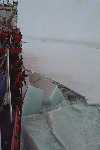
It was great! - there were seals, there were the mandatory
2 penguins hopping in a desperately comic way to get out of the path of
an onrushing icebreaker: and there were orcas ('killer whales') in the
open water along the ice edge. We must have seen a couple of dozen of the
ominous fins arching up through the water. The largest pod was 7 orcas
in a group, cruising the ice edge looking for seals or penguins or beakers
to eat, occasionally "spy-hopping" by coming vertically up, half-way out
of the water, looking for their lunch. Unfortunately they were so transitory
that it was impossible for me to get a photo. If I kept the camera out
and switched on, the cold temperatures would drain the batteries in a matter
of minutes. If I kept it warm inside my coat and switched off, the orca
was gone in a flash of black and white far too quickly. Finally, I closed
the camera up, put it away, and simply enjoyed the spectacle for myself.
Sorry folks, there are limits to the vicarious life. It was snowing and
blowing hard, darn cold, I was doing the best I could.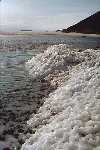
Mactown / fried chicken and gravy / bagdrag at 2030 / report for Pole flight at 0700. On my way.